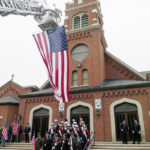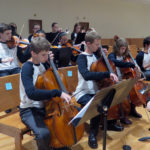By Lisa Powell
SAU Theological Perspective

Theodicy is an attempt to justify God’s goodness and power when confronted with the suffering wrought by natural or moral evil. If God is good, wouldn’t God want a world in which children don’t die of starvation or whole communities wash away in a tsunami? And if God is all powerful couldn’t God have created a world in which that isn’t our current reality?
Theodicies often develop by way of philosophical theology. Typically, they are not derived from the witness of Scripture or from God’s revelation in Jesus but are beholden to other methodologies. One of the most well-known is the Free Will Defense. Very simply put, it presumes that a world with free will is better than a world without it. God, being perfect, will create the better world and so the world God creates will have freedom; thus God is not responsible for the evil humans choose to do because of their free will.
Theodicies may also seem to measure suffering: what counts as such a “horrendous evil” that it requires a theodic response? The Holocaust is the typical example of moral evil. The COVID-19 pandemic is a recent example of a possible natural evil, with 7 million who died and counting. How many people have to die before it counts? How many people collectively have to suffer before an event warrants a defense of God?
Does the death of one child warrant a theodicy? Does God need to be defended or God’s goodness justified when faced with a singular loss? Philosophers and theologians would likely say no; individual loss or tragedy does not reach the necessary threshold of evil to warrant such explanation. Death is part of life and so on. Yet, when people experience pain, loss and personal tragedies, it often stirs these same questions nonetheless. My brother died in January at 44 and even last week my father said in tears, “I don’t know why God took him!” How many have asked God “why” in the thousands of years of generations? We are sometimes left to wonder how to make sense of living in the world such as it is.
German theologian Jurgen Moltmann says, “for me theology springs from a divine passion. It is the open wound of God in one’s own life and in the tormented men, women, and children of this world; from the accusation Job threw at God; from Christ’s cry of forsakenness on the cross … We are theologians because in the face of this world we miss God. We are crying out for his righteousness and justice, and are not prepared to come to terms with mass death on earth … It is simple, but true, to say that theology has only one, single problem: God. We are theologians for the sake of God … God is our dignity. God is our agony. God is our hope.”
Strangely, perhaps, the one writer who seems to express this the most to me, this sense of theology as grappling with the problem of God — of God as our dignity, agony and hope — is not a theologian at all, but Annie Dillard. She writes theodicies of another sort. Not explanations or justifications but offers vivid illustrations of the longing of missing God and the clamor for sense in the face of senseless suffering. She holds just enough wonder, beauty and honesty together that it may be a balm on those tender wounds, unlike the cold and careful logic problems of typical theodicy.
She is best known for her Pulitzer Prize winning non-fiction book “Pilgrim at Tinker Creek,” which hints at some of the questions that haunt much of her work. In her chapter “Fecundity” she marvels in horror at the amount of life that is produced and destroyed in an instant in the natural world, using aphids and their eggs as an example. Eggs laid by the millions and consumed in mass by lacewings. Nature is overflowing with this abundance of life and simultaneously voracious. She asks: “What kind of world are we living in? Why not make fewer eggs or larvae and give them a decent chance? Are we dealing in life or in death?”
Her most developed response, and the book I re-read for comfort following my brother’s recent passing, comes in “For the Time Being.” She weaves together a surprising array of images and moments in time, of teachings from Jewish mystics and Jesuit paleontologist Teilhard de Chardin. She doesn’t turn away from the horrible reality of suffering in the world, nor does she explain it away. She is able to hold it in its seriousness, along with wonder at the world such as it is: a world where babies continue to be born and civilizations are buried under your feet; where our human lives are woven together in this fabric of matter, with soil, with clouds and with some contact with the throb of the heart of God. She offers glimpses of God shot through the fabric of the universe and shows us where to look.
(Lisa Powell is professor and chair of the Theology Department of St. Ambrose University in Davenport. She serves as director of Justice, Diversity and Gender Studies and DEI curriculum coordinator.)











